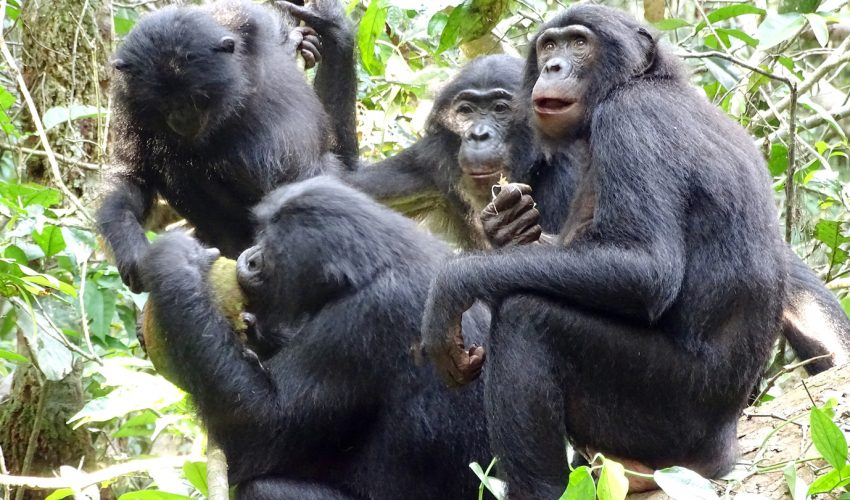Challenging the Notion Bonobos make friends outside their group and help each other like humans – study
Introduction
Bonobos, the endangered great ape species, have long fascinated scientists with their social behavior. Recent research has challenged the view that only humans are capable of forming strategic alliances and maintaining peaceful relationships between different groups. In this article, we will explore the remarkable levels of tolerance and cooperation observed among bonobos, shedding light on how complex behaviors like cooperation and conflict evolved in humans.
The Social Behavior of Bonobos
Bonobos exhibit pro-social behavior, actively seeking friendships outside their own groups and helping each other out. Unlike their close relatives, chimpanzees, bonobos display remarkable levels of tolerance between members of different groups. They often travel, feed, and rest together, forming strong bonds and sharing resources with select individuals, much like people in human societies.
This cooperative behavior is in stark contrast to chimpanzees, where relationships between different groups are often hostile and lethal aggression is not uncommon. The ability of bonobos to maintain peaceful between-group relationships and extend acts of pro-sociality and cooperation to out-group members challenges the notion that such behaviors are uniquely human.
Professor Martin Surbeck of Harvard University’s department of human evolutionary biology, a senior author on a study published in the journal Science, explains, “They (bonobos) preferentially interact with specific members of other groups who are more likely to return the favor, resulting in strong ties between pro-social individuals. Such connections are also key aspects of the cooperation seen in human societies.”
Evolutionary Implications
The findings from the study conducted by Professor Surbeck and his team can help us understand how complex behaviors like cooperation and conflict evolved in humans. The research focused on bonobos because, despite their remote habitat in the Democratic Republic of the Congo, they provide valuable insights into primate behavior.
Chimpanzees, which are easier to study, have been the main focus of primate behavior research. However, their more aggressive nature has led to previous models of human evolution assuming that group hostility and violence are innate to human nature. The study on bonobos challenges this assumption, suggesting that constant warfare between neighboring groups is not necessarily a human legacy and does not seem evolutionarily inevitable.
Observations in the Field
To conduct their study, Professor Surbeck and his team worked with the local Mongandu population in Kokolopori, a community of villages in the Democratic Republic of the Congo. They established the Kokolopori Bonobo Reserve, where they observed two small groups of bonobos consisting of 31 adults over a period of two years. These bonobos spent approximately 20% of their time together, providing ample opportunity for researchers to observe their behavior.
During their observations, the researchers analyzed 95 encounters between individuals from different groups. They found that these bonobos engaged in friendly and cooperative interactions, grooming each other, sharing food, and even forming coalitions. Although the primates did engage in aggressive interactions, these disputes were not lethal, further highlighting the stark contrast with chimpanzee behavior.
The Importance of Tolerance and Cooperation
Dr. Liran Samuni, the lead author of the study and a researcher at the German Primate Center, notes, “Tracking and observing multiple groups of bonobos in Kokolopori, we’re struck by the remarkable levels of tolerance between members of different groups. This tolerance paves the way for pro-social cooperative behaviors such as forming alliances and sharing food across groups, a stark contrast to what we see in chimpanzees.”
These findings have significant implications for our understanding of human evolution. They suggest that cooperation between unrelated individuals across groups, without immediate payoff, is not exclusive to humans. They also indicate that such cooperation can emerge in the absence of social norms or strong cultural dispositions. Bonobos challenge the notion that complex social behaviors are unique to humans, opening up new avenues of research into the evolutionary origins of cooperation and conflict.
Conclusion
Bonobos, the remarkable and endangered great ape species, challenge the notion that only humans are capable of forming strategic alliances and maintaining peaceful relationships between different groups. Their pro-social behavior, characterized by remarkable tolerance and cooperation, provides valuable insights into the evolution of complex social behaviors in humans. By studying bonobos, scientists are discovering that cooperation between unrelated individuals across groups is not exclusive to humans and can emerge without the presence of strong cultural dispositions. These findings invite further exploration into the origins of cooperation and conflict in our evolutionary history.
